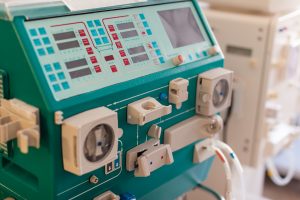 Chronic kidney disease (CKD) and kidney failure (end stage renal disease) in Americans costs Medicare billions. The new report suggests that 14 percent of Americans are affected by chronic kidney disease.
Chronic kidney disease (CKD) and kidney failure (end stage renal disease) in Americans costs Medicare billions. The new report suggests that 14 percent of Americans are affected by chronic kidney disease.
Researcher Rajesh Balkrishnan said, “This report is a one-stop shop to try to understand the prevalence of kidney disease, how it’s being treated and how the burden affects various populations. If we can identify which treatment modalities are working and how they’re used, and link these treatments to outcomes, we can inform the government of the most cost-effective ways to manage and treat the growing burden of kidney disease in the U.S.”
Advertisement
Kidney disease is affected by two major health problems in America: diabetes and high blood pressure.
In 2013, Medicare spent $31 billion on end stage renal disease and an additional $50 billion on chronic kidney disease for those over the age of 65.
Additional findings from the report include:
Spending on prescriptions for chronic kidney disease Medicare patients was 46 percent higher than for general Medicare patients.
Spending for end stage renal disease patients was greater, too: 2.6 times more than general Medicare patients. Dialysis patients had the greatest costs of $7,142 per patient per year.
Over 69 percent of Medicare patients with chronic kidney disease and 74 percent of those with kidney failure were enrolled in Medicare’s Part D (prescription drug benefits).
Having a better understanding of kidney disease can help improve health care policy, improve patient care, and potentially reduce costs for end stage renal disease. Balkrishnan added, “Our goal is to provide a snapshot view of the major issues in the diagnosis and treatment of kidney disease in the U.S. There are definitely gaps there in the treatment of many patients, which can be improved upon.”
Kidney disease and kidney stones: Fast facts
Kidneys are responsible for regulating the fluid levels in the body, filtering waste and toxins from the blood, releasing hormones that regulate blood pressure, activating vitamin D for bones, releasing the hormone that directs red blood cell production, and maintaining blood mineral balance. When the kidneys become damaged, these key functions can become impaired, and as damage continues these functions can become completely lost.
Twenty-six million Americans have kidney disease, and many of them not aware of it. High blood pressure and diabetes are the two leading factors of kidney disease and they also happen to be two growing problems in the U.S.
Kidney disease can go symptomless for many years, and this contributes to the lack of awareness from patients – they simply feel fine. Symptoms of kidney disease include fatigue, weakness, difficult or painful urination, foamy urine, pink or dark urine, increased need to urinate, puffy eyes, increased thirst, as well as swollen face, hands, abdomen, ankles, and feet.
One in 10 Americans will develop kidney stones in their lifetime. Kidney stones are described as one of the most painful conditions a person can endure. When a person develops kidney stones, the kidneys are slightly damaged. If kidney stones are recurring, then greater damage occurs, which overtime can contribute to kidney disease and other kidney-related problems.
Rising temperatures, hot weather, and lack of hydration have been found to be the factors for kidney stone development. Staying well hydrated, especially in the warmer months, can help reduce your risk of kidney stones.
Related Reading:
Kidney stone risk increases from melamine tableware and acidic foods
Kidney stones risk increases from melamine tableware and acidic foods. Melamine is commonly found in dishware, and research has found it may increase the risk of kidney stones. Expert Dr. Kenneth Spaeth, who wasn’t involved in the study, commented, “Melamine is a chemical used widely in industry and found in many household products. Continue reading…
Advertisement
Doctors not warning obese patients of kidney disease risk
Many doctors are not warning their obese patients of their risk of kidney disease. Lead author Dr. Michal Melamed said, “Even though chronic kidney disease typically manifests in older people, the disease can start much earlier but often is not recognized early on.” Continue reading…
Sources:
https://news.virginia.edu/content/kidney-disease-report-charts-mammoth-problem-us
https://www.kidney.org/news/newsroom/factsheets/FastFacts
